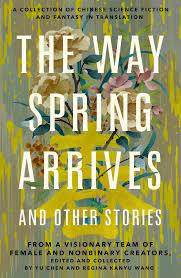March feels like a month of renewal, and our selections of translated literatures this week presents a wondrous and wide-ranging array of original thinking, ideations, philosophies, and poetics. From a revelatory collection of Chinese science fiction, to art critic María Gainza’s novel of forgery and authenticity, to Elena Ferrante’s new collection of essays on writing, and a debut collection of poetry from Iranian-Swedish poet Iman Mohammed—there is no shortage of discovery amidst these texts. Read on to find out more!

The Way Spring Arrives and Other Stories, edited and collected by Yu Chen and Regina Kanyu Wang, Tordotcom Publishing, 2022
Review by Ah-reum Han
The Way Spring Arrives and Other Stories is a trailblazing new anthology of Chinese science fiction and fantasy, created by and featuring the works of an all-female and nonbinary team of writers, editors, and translators. As a lifelong fan of the science fiction and fantasy genre but new to contemporary Chinese literary scene, I found this collection a true gift—warm and generous to the novice like myself, for whom Chinese literature has only ever been accessible through translation. Under the meticulous curatorial vision of Yu Chen and Regina Kanyu Wang, the stories and essays within celebrate decorated and emerging voices alike, indicating at an exciting future of sci-fi and fantasy for digital natives in our culturally porous world.
As you enter the collection, leave everything at the door and hold on tight. This book will whisk you away from one uncanny valley to the next—from a world where children raise baby stars as pets, to a near future where parenting is turned into a computer game, to a fisherman’s village where they practice the art of dragonslaying, to a woman on the road mysteriously burdened with a corpse, and much more. The title story, “The Way Spring Arrives” by Wang Nuonuo (trans. Rebecca F. Kuang), situates itself amidst the babbling creeks where giant fish carry the rhythm of the seasons on its back, delivering spring from year to year. In “A Brief History of Beinakan Disaster as Told in a Sinitic Language” by Nian Yu (trans. Ru-Ping Chen), we are caught in a post-apocalyptic world, where people live under the threat of devastating heat currents and history pervades as literal memory capsules passed down by a select few. Despite the imaginative heights these stories reach, each creates enough space in its strangeness for us to reexamine our assumptions about the world and our place in it. Often, folklore and fantasy crosses into sci-fi and allegory, and readers are left feeling unsettled in even the most familiar landscapes.
Between these stories, you’ll find essays on genre, gender, and translation that enrich the surrounding fictions; these intelligent texts help orient readers in socio-political, historical, and global contexts, while looking to the future of this young genre. In “Net Novels and the She Era,” Xueting Christine Ni discusses the role the internet has played in disrupting gender norms within publishing—particularly in the case of the popular online sci-fi serials. In Jing Tsu’s essay on the collection at hand, she points out: “This volume shows that there is also a difference between science fiction about women and other marginalized genders and the ones written by them.” We also hear from translators, such as Rebecca F. Kuang, who writes about the symbiotic relationship between writer, translator, and reader—the choices implicit in the things left unsaid. “What Does the Fox Say” by Xia Jia is a playful de-reconstruction of the famous English pangram—“The quick brown fox jumps over the lazy dog”—as both story and essay, illuminating the act of translation in a modern world of search engines, artificial intelligence, translation software, and media. As the author notes: “intersexuality is the dominant mode to create as well as to read most of the works in our time: quotation, collage, tribute, deconstruction, parody.” This collection pioneers its own conversation around its stories. We are paused at intervals to consider: who are we really, and where do we go from here? READ MORE…

